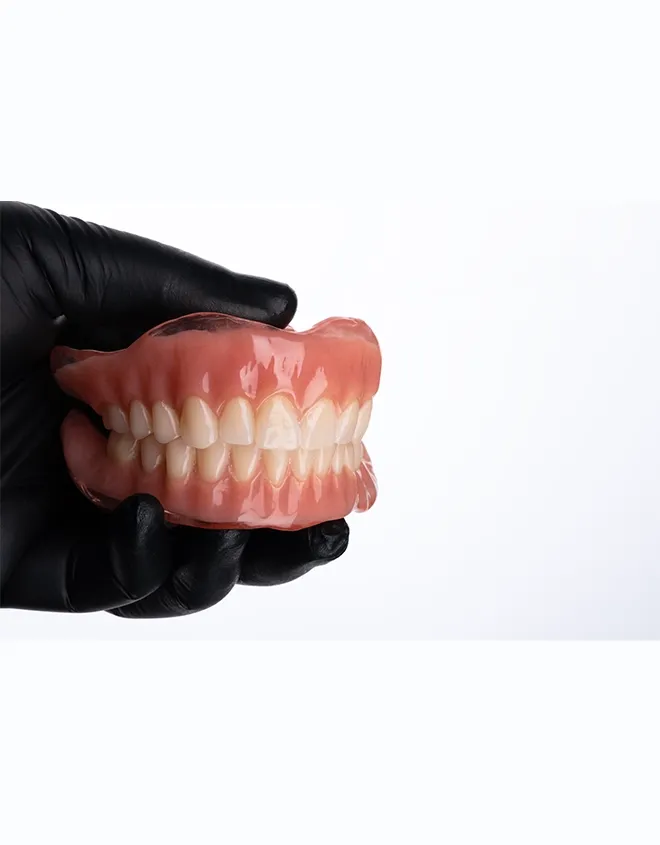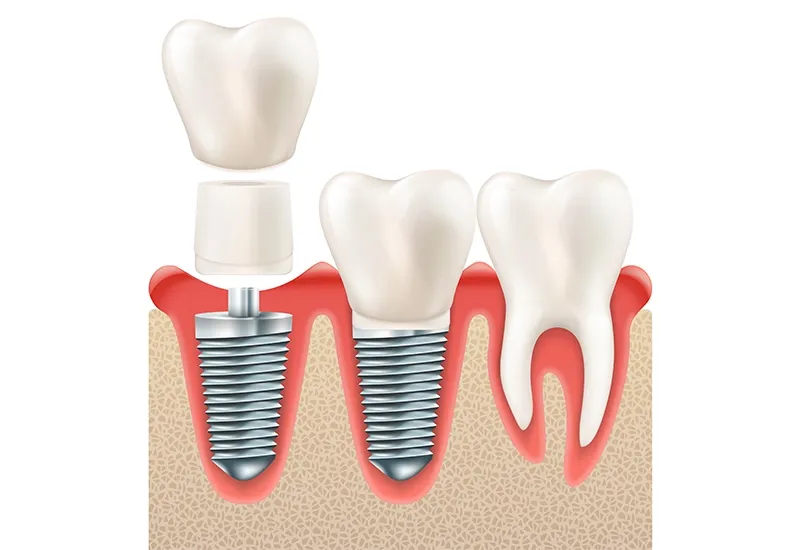Dentures vs. Dental Implants: Pros, Cons, and Costs
by Dr. Azadeh Hosseini
15 October 2025

Tooth loss is more common than many people realize. Whether caused by aging, gum disease, injury, or severe decay, missing teeth can affect more than just your smile it can impact chewing, speaking, self-confidence, and long-term oral health. Fortunately, modern dentistry offers multiple solutions for replacing missing teeth. Two of the most common and effective options are dentures and dental implants.
If you’re exploring which solution might work best for you, it’s important to understand the pros, cons, and costs of each. Both treatments can restore function and aesthetics, but they work very differently. This guide breaks down how each option works, what benefits they provide, their limitations, and how to decide between them.

What Are Dentures
Dentures are removable prosthetic appliances designed to replace missing teeth. They come in two main forms: full dentures, which replace an entire arch of teeth, and partial dentures, which replace several missing teeth while fitting around natural teeth. Dentures are custom-made from acrylic, metal, or a combination of materials to mimic the appearance of natural teeth and gums.
The process typically involves taking impressions of your mouth, creating a mold, and fitting the dentures to ensure comfort and stability. Over time, adjustments may be needed as the shape of your gums and jawbone changes.
Dentures have long been a reliable solution for tooth replacement, especially for patients missing many or all of their teeth.
What Are Dental Implants
Dental implants are considered the most advanced and permanent solution for replacing missing teeth. An implant consists of a titanium post surgically placed into the jawbone, which acts as an artificial tooth root. Once healed, the post supports a crown, bridge, or even a full denture that looks and functions like natural teeth.
The process usually requires several stages: surgical placement of the implant, a healing period for the bone to fuse with the implant (a process called osseointegration) and finally attaching the prosthetic tooth or teeth. When successful, implants provide stability, durability, and long-term protection for the jawbone.
Pros and Cons of Dentures
Pros of Dentures
Dentures offer a number of benefits. They are generally more affordable upfront than implants, making them accessible to more patients. They can be fabricated relatively quickly, allowing tooth replacement in weeks rather than months. Modern dentures also look natural and can restore facial volume, which may be lost due to missing teeth. Another advantage is that dentures are non-surgical, making them suitable for patients who cannot undergo implant surgery due to health concerns.
Cons of Dentures
Despite their benefits, dentures have limitations. Because they rest on the gums, they may slip or shift during eating and speaking, which can cause discomfort or embarrassment. They also require ongoing maintenance, including daily removal for cleaning. Over time, bone loss in the jaw can change the fit, leading to the need for relines or replacements. Dentures generally do not preserve bone health the way implants do, and some patients find them less stable for chewing harder foods.
Pros and Cons of Dental Implants

Pros of Implants
Implants are highly regarded for their stability and natural function. They feel and perform much like natural teeth, allowing patients to chew, bite, and speak confidently without worry of shifting. Because the implant integrates with the jawbone, it helps prevent bone loss and preserves the facial structure. Implants are also long-lasting when cared for properly, they can remain functional for decades, often longer than dentures or bridges. Many patients appreciate the fact that implants are a fixed solution, meaning no removal for cleaning is necessary.
Cons of Implants
On the other hand, implants involve a higher upfront cost than dentures and require surgery, which may not be suitable for everyone. The process also takes longer, with healing time sometimes stretching over several months. Patients with insufficient bone density may need additional procedures, such as bone grafting, to support implants. While highly successful, implants are not guaranteed in every case, and factors like overall health, oral hygiene, and lifestyle choices (such as smoking) can affect long-term success.
Who Should Consider Dentures
Dentures are often recommended for patients who are missing multiple teeth or a full arch, particularly if they want a non-surgical and relatively quick solution. They may also be best for patients who are not candidates for surgery due to medical conditions or who prefer a lower-cost option. With modern designs, dentures can be made more comfortable and natural-looking than ever before.
Who Should Consider Dental Implants
Dental implants are an excellent option for patients who want a long-term, permanent solution that closely replicates natural teeth. They are especially beneficial for those who have enough jawbone density to support the implant and are in good general health. Implants can replace a single tooth, multiple teeth, or even support a full denture for maximum stability. For adults seeking the most durable and functional option, implants often provide the greatest satisfaction.
Making the Right Choice Dentures or Implants
So, should you choose dentures or implants? The answer depends on your unique needs, health status, and long-term goals. Dentures may be more practical for patients who want a quicker, lower-cost solution without surgery, while implants may be the better choice for those seeking a permanent, bone-preserving replacement that feels most like natural teeth.
Your dentist will evaluate your oral health, review your medical history, and discuss lifestyle factors to help you make the best decision. Both dentures and implants can significantly improve quality of life it’s a matter of finding the option that aligns with your priorities.
"Your smile deserves the right foundation whether through dentures or implants, choose the solution that restores confidence, comfort, and lasting strength."
Costs: Dentures vs. Implants
When it comes to costs, the difference between dentures and implants can be significant. Dentures generally have a lower initial cost, which makes them appealing to patients who need a quick, budget-friendly solution. However, they may need replacement or relining over the years, leading to additional expenses.
Dental implants, on the other hand, require a higher upfront investment. The cost varies depending on how many implants are placed and whether additional procedures are required. Yet, because implants can last decades or even a lifetime with proper care, they are often considered more cost-effective in the long run.
It’s also important to note that insurance coverage differs: some dental insurance plans may cover part of the cost of dentures but only partially cover implants. Discussing options with your dentist and insurance provider can give you a clearer picture of the financial aspect.
Conclusion
Tooth replacement is not a one-size-fits-all decision. Both dentures and dental implants offer distinct benefits and challenges, and the right choice ultimately depends on your oral health, preferences, and long-term vision for your smile. While dentures provide a faster, more affordable solution, implants deliver unmatched stability and bone preservation that can last for decades.
If you’re weighing dentures vs. implants, the most important step is consulting with a dentist who can provide a personalized assessment and guide you through your options. Don’t let missing teeth hold you back from smiling, eating, and speaking with confidence schedule a consultation with your dental professional to explore whether dentures or implants are right for you.
Resource:
Disclaimer
*This media/content or any other on this website does not prescribe, recommend, or prevent any treatment or procedure. Therefore, we highly recommend that you get the advice of a qualified dentist or other medical practitioners regarding your specific dental condition. *
